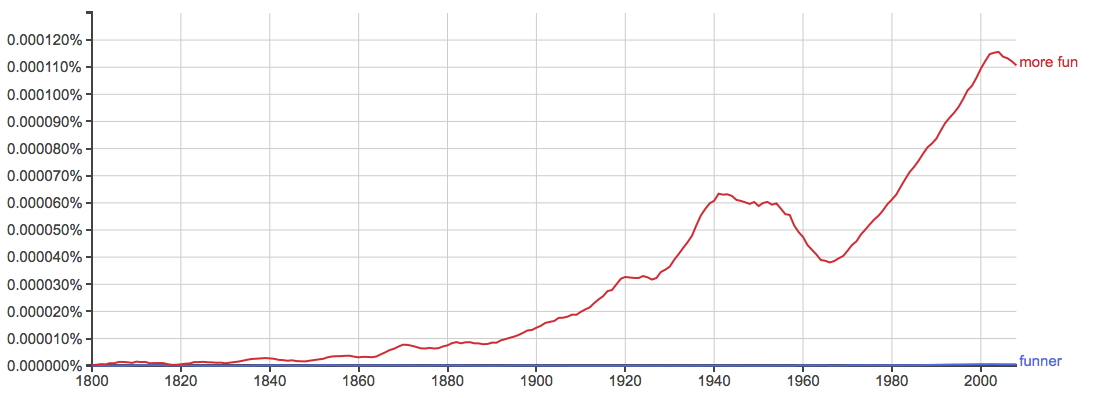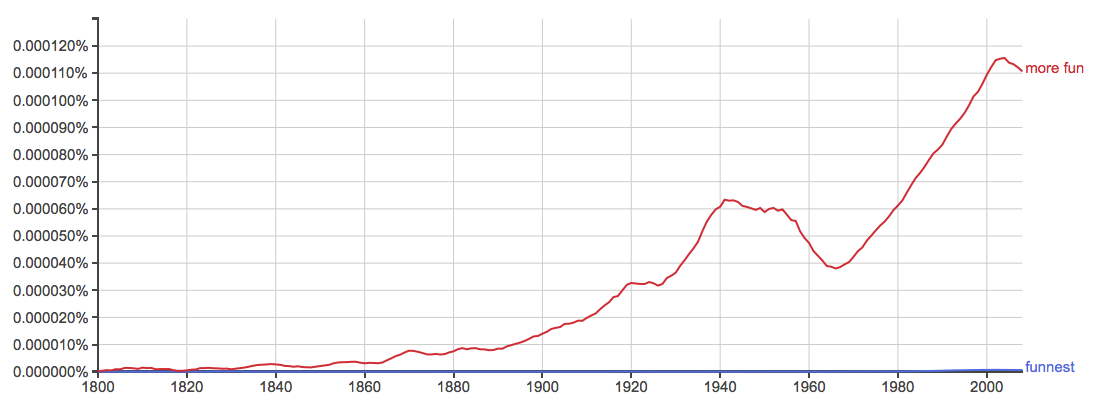As is the case with most English and grammar related topics, people tend to have strong opinions one way or the other. Today’s topic is no different, and I expect this post to elicit some strong opinions between the two primary camps.
On the one side, you have those who say that fun can never take the comparative and superlative endings that are typical of adjectives, i.e., funner, funnest.
On the other side, you have those who say that fun is well established as an adjective in writing and speech, and, therefore, must be allowed to inflect like one.
Is Funner a Real Word: How about Funnest?
In this post, I hope to reach some type of middle ground between these two camps and advise the average writer on how to proceed with the word fun. Is funner a word? Is funnest a word?
Let’s find out.
Is Fun a Noun?
What everyone agrees on is the fact that fun is a noun. It emerged as such in the late 17th century as a “cant” or slang word.
- We had fun at the party last night.
- Riding a motorcycle is great fun.
- Seibert also brings in the matter of personality—charisma and charm, which are crucial matters in tap—and he has some fun with people who were short on it. –The New Yorker
The phrase “we had fun” is the grammatical equivalent of “we had pizza.”
- We had fun at the party last night.
- We had pizza at the party last night.
Yes, fun is more of an abstract idea than a physical pizza, but they both function as nouns in such a sentence.
Is Fun an Adjective?
 The differences in opinion only arise when the following question is asked, “Can fun be an adjective?”
The differences in opinion only arise when the following question is asked, “Can fun be an adjective?”
- That was a fun movie.
- We had a fun time.
- The beach is a fun place.
In all of the above sentences, fun is being used as if it were an adjective. Is this acceptable? That depends, largely, on whom you ask and their age.
As I mentioned above, everyone agrees that fun is a noun, and for more than 200 years, it functioned almost exclusively as a noun.
Sometime in the early-to-mid 1900s its use began to drift, probably as a result of its quasi-adjective/ambiguous use in phrases like “a fun fair” or sentences like “It is fun to ski.” It’s still being used as a noun in these two examples, but it looks as if it could be an adjective. This ambiguity probably led to its misuse.
Traditionalists hold that fun can only function as an noun, while others claim it can be an adjective too.
The Oxford English Dictionary states that the use of fun as an attributive adjective (a fun trip) is now established in informal use but is not accepted in Standard English. The American Heritage Dictionary advises writers to avoid it in formal writing.
This would be my advice as well. If you want your writing to appear authoritative, I would advise you not to use fun as an adjective. If you are writing a research paper, job cover letter, resume, college application, etc., you should avoid this use and hold to the traditional rule:
- Fun is a noun, not an adjective.
Funner or More Fun?
While the use of fun as an attributive adjective (a fun time) is common to hear in informal speech, the comparative and superlative forms funner and funnest, as if fun were a standard adjective, is another matter altogether.
Outside of direct quotations, usually those of small children, the use of funner is almost universally rejected and almost never appears in printed sources.

The above graph charts funner vs. more fun in books since 1800. In the past 200 years, funner has barely even registered in these print sources across American and British English.

The same goes for funnest; you can hardly make out the line of its printed use.
This should be expected, of course. These types of nonstandard words are usually only found in speech and not in edited prose.
What’s the Bottom Line?
 When asked the question, “Should I write funner or more fun?” I answer unequivocally more fun. I say this for a few reasons.
When asked the question, “Should I write funner or more fun?” I answer unequivocally more fun. I say this for a few reasons.
First, I am among the group of writers who find funner and funnest to be particularly grating, so, on some level, it is a personal preference.
Second, I think this is the majority consensus of readers and writers. With the popular use of these two forms, more fun or funner / most fun or funnest, so incredibly lopsided, it is clear to see what is acceptable and what is unacceptable.
More fun is accepted; funner is not.
Most fun is accepted; funnest is not.
If you want to be taken seriously as a writer or you are an ESL student learning the language, do not use funner or funnest or your writing.
Summary
Fun is increasingly being used as an attributive adjective in informal contexts.
If one were doing a piece of formal writing, research paper, resume, cover letter, dissertation, etc., I would advise the writer to steer clear of fun as an adjective.
Avoid completely the words funner and funnest.
Contents
